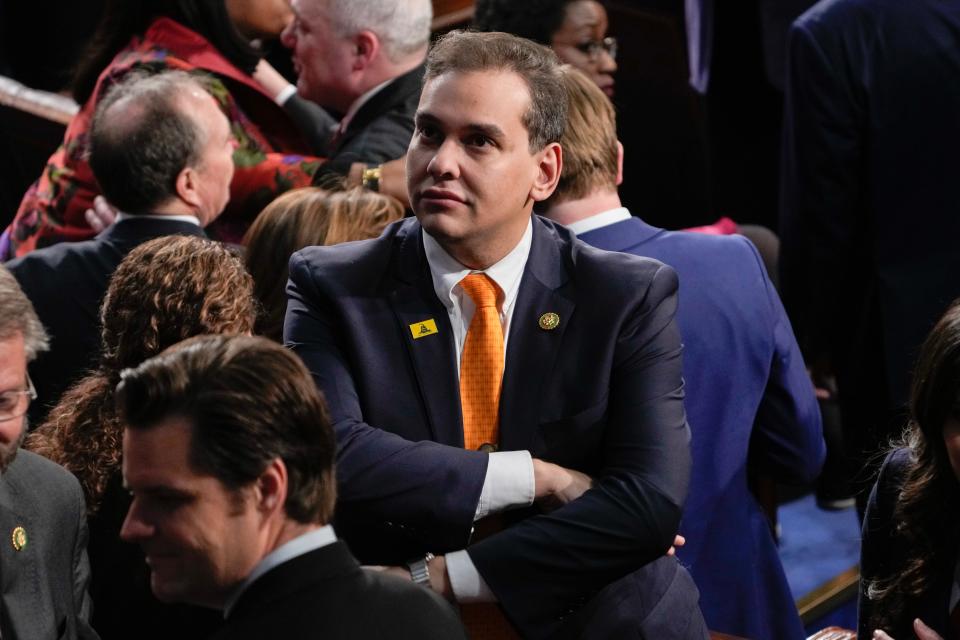'Sleazy but not criminal': Some George Santos fabrications likely protected by the First Amendment
- Oops!Something went wrong.Please try again later.
WASHINGTON – New York Rep. George Santos faces a series of investigations and growing hostility from Republicans for lying about his background while running for office. But legal experts say the fabrications, on their own, are likely protected by the First Amendment – along with other speech many Americans may find objectionable.
Santos acknowledged lying about his education and his career. "He is a sick puppy," Sen. Mitt Romney, R-Utah, said this week after confronting Santos on the House floor before President Joe Biden's State of the Union address.
The Long Island congressman told USA TODAY this week that he will not resign, despite calls for his removal. "It's their prerogative," Santos said of a resolution introduced by House Democrats to expel him from Congress. "They can do whatever they want."
Confrontation: Romney calls George Santos 'a sick puppy' after State of the Union
'Sociopath': What Mitt Romney, other Republicans have called George Santos
When lying is illegal
Not all lying is protected by the First Amendment: Americans can't lie in connection with committing financial fraud, for instance. Lying under oath is perjury. Even when not under oath, lying to the federal government – such as to the FBI or the Securities and Exchange Commission – can lead to hefty fines and prison.
But lying for votes, experts say, is not likely a crime on its own.
"I frequently tell my students there is a lot of sleazy, unethical, rotten conduct that isn’t criminal," Randall Eliason, a former federal prosecutor and a professor at George Washington University Law School, wrote recently on his Sidebars blog. "Santos is a liar and a fraud who does not deserve to be in Congress. But his lies about his background almost certainly fall into that 'sleazy but not criminal' category."
Committees: Santos quits House committee seats amid uproar over lies
Explainer: What the First Amendment protects – and what it doesn't
Federal prosecutors appear to be focused at least in part on Santos' financial dealings, according to reports by several news organizations – and that likely would not implicate a conflict with the First Amendment. Questions about Santos' financial dealings, for instance, have included the sources of funding for his 2022 campaign.
What we know: Companies linked to embattled congressman George Santos draw scrutiny

At least 16 states have statutes that prohibit false statements about a candidate for public office, according to research by the University of North Carolina at Chapel Hill – although those laws are largely geared at people leveling false charges against a candidate rather than dealing with candidates making stuff up about themselves.
Several experts said they are not aware of any New York law that deals directly with a candidate fabricating a resume or lying about an opponent – a point backed up by the UNC research.
"I'm unaware of a court that has punished in any way a candidate who has made up false allegations about an opponent," said Jerry H. Goldfeder, a veteran election attorney in New York and author of a treatise described as a "bible for NY election lawyers."
Lying about military honors
Though not directly on point, the Supreme Court touched on some of the same legal principles in a 2012 decision striking down the Stolen Valor Act. That 2005 federal law made it a crime to falsely claim military honors such as the Congressional Medal of Honor. A California man, Xavier Alvarez, was convicted of violating the law after claiming during a 2007 public meeting that he had been awarded the Medal of Honor in 1987.
Alvarez, it turned out, had never served in the military at all.
"Lying was his habit," Associate Justice Anthony Kennedy wrote of Alvarez for a plurality of the court. A 6-3 majority agreed that the First Amendment protected Alvarez's lies and overturned his conviction. Laws that suppress speech, Kennedy wrote, "must be judged by the sometimes inconvenient principles of the First Amendment."

Court: Campaign lies 'likely' protected
A federal appeals court in Virginia ruled Wednesday that a 90-year-old North Carolina law that bans people from publishing "derogatory" information about a political candidate they know to be false or that shows a "reckless disregard" for the truth likely violates the First Amendment. The three-judge panel unanimously tossed out a lower court's ruling.
The case centers on an investigation by a county prosecutor into a campaign ad run in 2020 by North Carolina's attorney general, Democrat Josh Stein. That ad criticized Stein's Republican opponent, Jim O'Neill, for a backlog of rape kits. O'Neill, a county prosecutor, argued that police were responsible for the backlog, not his office.
Tracker: A look at the key cases pending at the Supreme Court
Stay in the conversation on politics: Sign up for the OnPolitics newsletter
The U.S. Court of Appeals for the 4th Circuit ruled that the law targeted certain speech based on its content and was not permissible under the Frist Amendment.
Under the law, "speakers may lie with impunity about businesspeople, celebrities, purely private citizens, or even government officials so long as the victim is not currently a 'candidate in any primary or election,'" the court wrote. "That is textbook content discrimination."
Contributing: Candy Woodall, Rachel Looker
This article originally appeared on USA TODAY: George Santos lies: Experts say some likely protected by 1st Amendment

